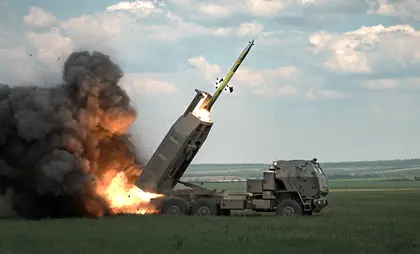During his unannounced visit to Kyiv on Monday, the US Defense Secretary, Lloyd Austin announced additional military aid for Ukraine, despite the ongoing impasse on wider funding in Congress.
“I announced today another $100 million drawdown using presidential drawdown authority to provide additional artillery munitions, additional interceptors for air defense and a number of anti-tank weapons as well,” Austin told reporters in Kyiv.
JOIN US ON TELEGRAM
Follow our coverage of the war on the @Kyivpost_official.
While he did not mention including an additional High Mobility Artillery Rocket System (HIMARS), announcements released by both the US Department of Defense and the US State Department to coincide with Austin’s visit did.
Although there was no indication that the package included anything “out of the ordinary,” speculation among Washington / Kyiv watchers immediately seized on the inclusion of the single HIMARS.
The Ukrainian military issues website Militarnyi in its review of the announcement on Monday included the line: “The transfer of only one US M142 HIMARS rocket system may indicate that it will have a unique modification of the launcher.”
On Tuesday David Axe, a defense correspondent for Forbes doubled down on this and wondered why the announcement “also includes exactly one… HIMARS. Exactly why the Americans would send another HIMARS when Ukraine already has 38 HIMARS plus 23 similar M270 tracked launchers – and hasn’t lost any of them – is hard to say for sure.”

Which Foreign Leaders Are Invited to Trump’s Inauguration?
He then began excitedly (his word) to speculate that it was because this extra HIMARS may have been modified in some way, perhaps “to fire a new, long-range munition,” maybe the Ground-Launched Small-Diameter Bomb?
Later the same day Newsweek picked up on the excitement generated by Militarnyi’s and Axe’s conjecture wondering if: “A new US-supplied High Mobility Artillery Rocket System (HIMARS) slated to be sent to Ukraine may include a modification that crosses Russian President Vladimir Putin’s ‘red line’.”
Newsweek also wondered if this HIMARS had been modified for long-range use to fire the GLSDB or additional long-range Army Tactical Missile Systems (ATACMS) missiles. But neither of these weapons cross Moscow’s “red line.”
The shorter-range M39 version of the ATACMS missile, with its maximum range of 165 kilometers (103 miles) has already been used by Ukraine against Russian forces up to half a dozen times since their arrival in early October.
If the US now supplies the later M39A1 version with its range of up to 300 kilometers (190 miles) then, if Ukraine chose to it could extend its reach into Russia, but Kyiv has already undertaken not to do so - which was apparently a pre-requisite ofr the US releasing the weapons.
In any event, the launchers already possessed by Ukraine’s Armed Forces (AFU) don’t need any special modification to fire either version of the ATACMS.
The Ground Launched Small Diameter Bomb (GLSDB) was developed by Boeing and the Saab Group which pairs Boeing’s 110-kilogram (250 pounds) GBU-39 Small Diameter Bomb (SDB), with the M26 rocket. This munition has a range of 150 kilometers (93 miles) – well within the envelope of any “red line” – and was specifically designed to be launched from the M270 Multiple Launch Rocket and M142 HIMARS systems - without modification.
In June, the US Congress was told that Ukraine would receive GLSDB missiles “no earlier than autumn” because of development and production issues. On Oct. 14, Boeing said that the GLSDB would be delivered to Ukraine by the winter.
So other than an increase in the number of missiles/projectiles available for use by Ukraine, the US announcement and neither of these weapons suggest the promise of a new modified version of HIMARS.
It also seems highly unlikely that the US is about to supply an unknown missile or even the HIMARS replacement, the new Precision Strike Missile (PrSM), which successfully completed its production qualification flight test recently. While its 499-kilometer (310-mile) range would be a game changer, the US Army hasn’t yet received any. And in any case, the PrSM is designed to be fired from the same, unmodified launchers as the HIMARS and GLDSB.
As with many things perhaps the simplest answer is the actual one – the US found it had a spare HIMARS launcher gathering dust and thought that Ukraine would make better use of it.
You can also highlight the text and press Ctrl + Enter










